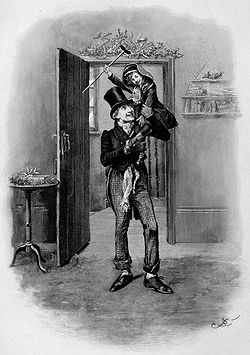Tiny Tim (A Christmas Carol)
| "Tiny Tim" Cratchit | |
|---|---|
| A Christmas Carol character | |

Bob Cratchit and Tiny Tim Cratchit as depicted in an illustration by Fred Barnard
|
|
| Created by | Charles Dickens |
| Portrayed by | See below |
| Information | |
| Nickname(s) | Tiny Tim |
| Gender | Male |
| Family |
Bob (father) Mrs. Cratchit (named Emily in some adaptations)(mother) Martha Cratchit Belinda Cratchit Peter Cratchit Unnamed sister Unnamed brother (siblings) |
Timothy Cratchit, called "Tiny Tim", is a fictional character from the 1843 novella A Christmas Carol by Charles Dickens in the Victorian era. He is a minor character, the youngest son of Bob Cratchit, and is seen only briefly, but serves as an important symbol of the consequences of the protagonist's choices.
When Ebenezer Scrooge is visited by the Ghost of Christmas Present he is shown just how ill the boy really is (the family cannot afford to properly treat him on the salary Scrooge pays Cratchit). When visited by the Ghost of Christmas Yet to Come, Scrooge sees that Tiny Tim has died. This, and several other visions, lead Scrooge to reform his ways. At the end of the story, Dickens makes it explicit that Tiny Tim doesn't die, and Scrooge becomes a "second father" to him.
In the story, Tiny Tim is known for the statement, "God bless us, every one!" which he offers as a blessing at Christmas dinner. Dickens repeats the phrase at the end of the story; this is symbolic of Scrooge's change of heart.
Dickens often used his characters to demonstrate the disparity between social classes that existed in England during Victorian era, namely the hardships suffered by the poor. These representative characters are typically children, presumably because children are most dependent upon others for survival, especially when they come from lower social classes. Tiny Tim is among these characters, and is the most notable example in A Christmas Carol.
When the audience first meet Tiny Tim, he rests upon his father's shoulder, suggesting that while the Cratchits love their boy dearly, his situation is nonetheless a burden on the family. Further representative of this burden is Tiny Tim's crippled condition. That he is crippled evokes the financial issues that many poor families faced in 19th-century England. Although his spirit is robust, Tiny Tim's life expectancy is questionable. His crutch and iron frame support his frail body, but more support is needed for Tim if he is to survive, as pointed out by the Ghost of Christmas Present in stave III: "I see a vacant seat in the poor chimney corner, and a crutch without an owner, carefully preserved. If these shadows remain unaltered by the future, the child will die." These are a microcosm of the impoverished population: without support or charity, their family will be reduced.
...
Wikipedia
